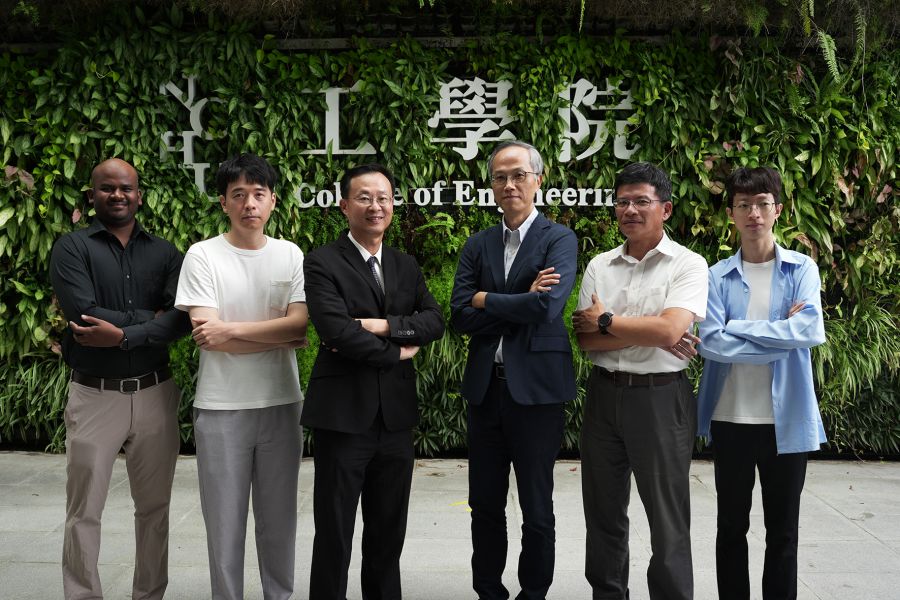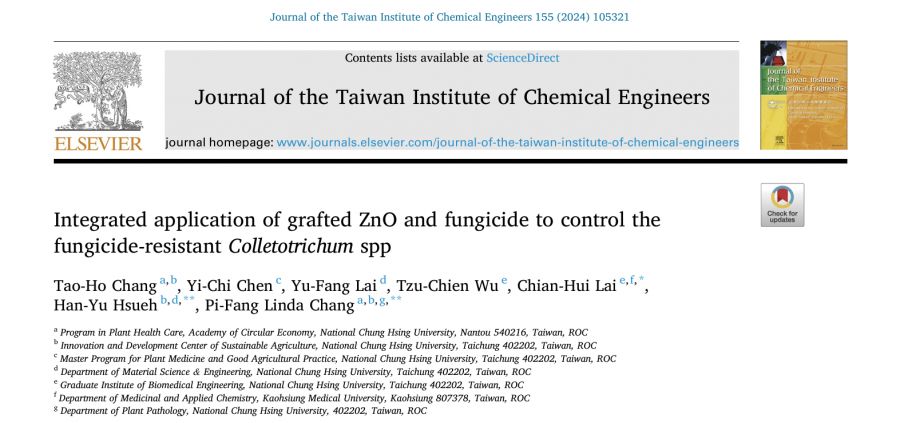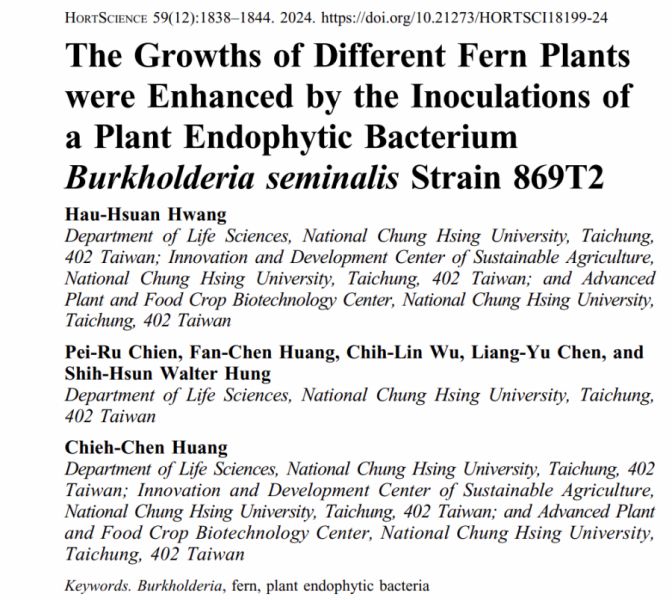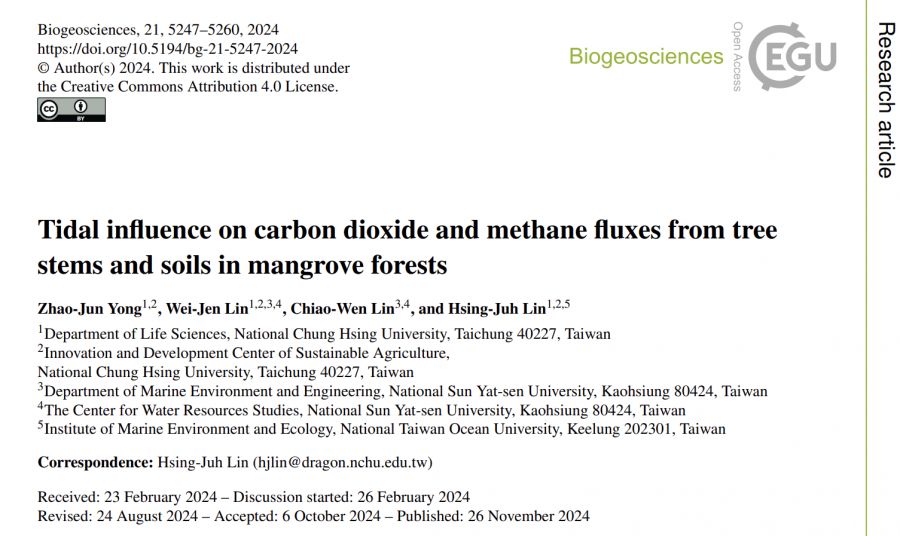| 論文篇名 | 英文:Influence of the seagrass Thalassia hemprichii on coral reef mesocosms exposed to ocean acidification and experimentally elevated temperatures 中文: 海草可提升面臨海水酸化及暖化影響珊瑚之抵抗力 |
| 期刊名稱 | Science of the Total Environment |
| 發表年份,卷數,起迄頁數 | 2019, https://doi.org/10.1016/j.scitotenv.2019.134464 |
| 作者 | Liu PJ, Ang SJ, Mayfield AB, Lin HJ |
| DOI | 10.1016/j.scitotenv.2019.134464 |
| 中文摘要 | 我們利用珊瑚礁中觀生態池(mesocosm),模擬海水CO2升高(海水酸化)及海水暖化造成的氣候變遷情境,對有泰來草(Thalassia hemprichii)伴生之珊瑚礁生態系(海草組)和無海草伴生之珊瑚礁生態系(無海草組)的影響。珊瑚礁中觀生態池位於國立海洋生物博物館內的水族實驗中心,為玻璃纖維構成的6個容量約5噸之海水生態池(3m長 × 2m寬 × 1m高),生態池內蓄養南灣珊瑚礁主要生物,以模擬南灣珊瑚礁生態系。 我們的研究結果顯示未來氣候變遷導致海水酸化及海水升溫至31˚C時,升高的海水溶解態無機碳(DIC)濃度會促進海草生長,大型藻類也會開始依賴CO2作為主要的碳元素來源,因此大型藻類也會快速生長,但令人訝異的是海水酸化對於中觀生態池內的細枝鹿角珊瑚並沒有影響。可是當海水酸化後,無海草伴生之生態池內大型藻類大量繁生,比有海草伴生之生態池長得更多,導致無海草之生態池之淨生態系統生產量(NEP)隨之上升,生態系統不穩定度加大。 有趣的是處於海水酸化時,無海草伴生之珊瑚鈣化速率卻顯著低於有海草伴生之珊瑚。推測原因是海草會與大型藻類競爭營養鹽而抑制大型藻類之過度生長,間接減少了大型藻類與珊瑚的競爭,因此以維持珊瑚之鈣化速率。最近國外研究亦發現海草床的存在可以減少珊瑚之病原體,雖然確切之機制仍不明。因此總結我們的研究以及相關文獻可以發現海草具有減少珊瑚礁病原體的潛能以維持珊瑚健康,能維持其鈣化速率。 海水酸化後並升溫至31˚C後,對珊瑚礁生態系的影響最為明顯。此時珊瑚的光合作用最大光效能(Fv/Fm)與鈣化速率以及大型藻類的生長速率都顯著下降。但是海草植株密度、Fv/Fm和葉片生長速率卻是顯著上升,也導致無海草伴生和有海草伴生的NEP皆急劇下降,但是無海草伴生下降的幅度大於有海草伴生生態池。有海草生態池之各項生態系統代謝參數在海水酸化和暖化的情境下,皆較無海草伴生之生態池穩定,因此海草具有提升珊瑚對抗海水酸化及暖化之潛能。 綜而言之,未來面臨氣候變遷海洋酸化和暖化時,海草床具有維持珊瑚鈣化作用、減少大型藻類增生並穩定珊瑚礁生態系之潛能,進而維持海洋沿岸生物多樣性。因此未來更需致力於海草床保育,以減緩氣候變遷產生對於珊瑚礁生態系的衝擊。 |
| 英文摘要 | Ocean acidification (OA) and warming currently threaten coastal ecosystems across the globe. However, it is possible that the former process could actually benefit marine plants, such as seagrasses. The purpose of this study was to examine whether the effects of the seagrass Thalassia hemprichii can increase the resilience of OA-challenged coral reef mesocosms whose temperatures were gradually elevated. It was found that shoot density, photosynthetic efficiency, and leaf growth rate of the seagrass actually increased with rising temperatures under OA. Macroalgal growth rates were higher in the seagrass-free mesocosms, but the calcification rate of the model reef coral Pocillopora damicornis was higher in coral reef mesocosms featuring seagrasses under OA condition at 25 and 28°C. Both the macroalgal growth rate and the coral calcification rate decreased in all mesocosms when the temperature was raised to 31°C under OA conditions. However, the variation in gross primary production, ecosystem respiration, and net ecosystem production in the seagrass mesocosms was lower than in seagrass-free controls, suggesting that the presence of seagrass in the mesocosms helped to stabilize the metabolism of the system in response to simulated climate change. |
Influence of the seagrass Thalassia hemprichii on coral reef mesocosms exposed to ocean acidification experimentally elevated temperatures 2019-09-13

生態農業:農業溫室氣體減量【生科系林幸助特聘教授】






